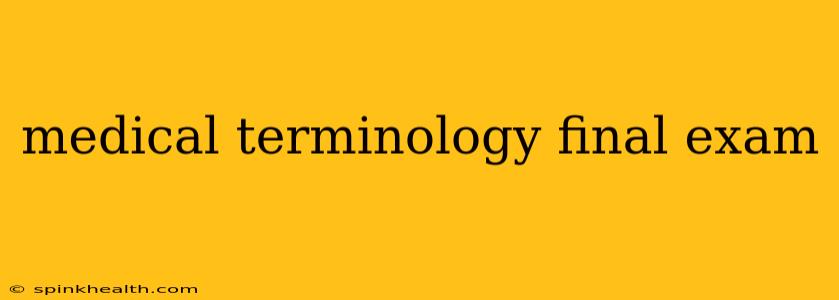Conquering the Medical Terminology Final Exam: A Student's Tale
The air in the lecture hall crackled with nervous energy. Professor Schmidt's infamous medical terminology final exam loomed, a behemoth of prefixes, suffixes, and root words threatening to derail even the most dedicated students. I, Sarah, a bright but slightly anxious pre-med student, was no exception. This wasn't just another test; this was the gatekeeper to my future. My success hinged on mastering the complex language of medicine. This is the story of my journey to conquer that final exam, and hopefully, it will help you conquer yours too.
What are the most common medical prefixes, suffixes, and root words?
This was the question that haunted my dreams. It felt like trying to memorize a dictionary. The key, I discovered, wasn't rote memorization, but understanding the building blocks. Focus on the common ones. Prefixes like a- (without), brady- (slow), tachy- (fast), hyper- (excessive), and hypo- (deficient) are fundamental. Suffixes like -itis (inflammation), -ectomy (surgical removal), -oma (tumor), -pathy (disease), and -algia (pain) are equally important. Then, there are crucial root words like cardi- (heart), hepat- (liver), derm- (skin), gastr- (stomach), and neur- (nerve). Mastering these core elements allowed me to break down even the most complex medical terms.
How can I study effectively for a medical terminology exam?
Effective studying wasn't about cramming the night before. It was about building a strong foundation. I started by creating flashcards, not just for individual terms, but also for groups of terms with similar prefixes, suffixes, or root words. This helped me see patterns and connections. I also used online quizzes and practice exams to test my understanding and identify areas where I needed more work. Regular, spaced-out revision sessions were crucial, reinforcing what I learned. Finally, forming study groups proved invaluable; explaining concepts to others solidified my own understanding.
What are some common medical abbreviations and their meanings?
Medical abbreviations are like a secret code, and understanding them is essential. Some common ones include: a.c. (before meals), p.c. (after meals), q.i.d. (four times a day), b.i.d. (twice a day), t.i.d. (three times a day), prn (as needed), Rx (prescription), s.c. (subcutaneous), i.m. (intramuscular), and i.v. (intravenous). Understanding these abbreviations is vital not only for the exam but also for future medical practice.
How do I approach medical terminology if I have a learning disability?
Medical terminology can pose unique challenges for those with learning disabilities. It's crucial to tailor your study approach to your specific needs. Seek support from your institution's disability services; they can provide accommodations like extra time, assistive technology, or alternative assessment methods. Break down your study sessions into smaller, manageable chunks, focusing on one concept at a time. Utilize visual aids, such as diagrams and color-coded notes. Collaborate with classmates or tutors for clarification and support. Don't be afraid to ask for help; resources are available to assist you in achieving your academic goals.
Are there any mnemonics or memory techniques that can help with medical terminology?
Absolutely! Mnemonics are a lifesaver. Creating rhymes, acronyms, or visual imagery can significantly improve retention. For instance, to remember the meaning of "tachycardia" (fast heart rate), I imagined a cheetah (tachy-) racing (cardia-). The more creative and memorable your mnemonic, the better it will stick.
The day of the final exam arrived, and while I still felt a flutter of nerves, I was confident. My systematic study approach, understanding of the underlying principles, and the support from my study group had equipped me well. I walked out of that exam room not just with a sense of accomplishment but also with a newfound appreciation for the intricate and fascinating world of medical terminology. The journey was challenging, but the reward—a solid foundation for my future medical career—was worth every effort. Remember, conquering the medical terminology final exam isn’t about memorization alone; it’s about understanding, application, and strategic preparation. Good luck!

